Formula for a Shortage
post by Zvi · 2022-05-19T19:30:01.501Z · LW · GW · 9 commentsContents
FDA Delenda Est WIC and the Pre-Existing Market Pro Trust Versus Anti Trust We Must Do More The Starving Babies Caucus Practical Considerations Conclusion: What Now? Everything Everywhere All At Once None 9 comments
Previous coverage (not required in any way): Formula For Dying Babies
Great Formal Workups of Much of This (Scott Lincicome): America’s Infant Formula Crisis and the ‘Resiliency’ Mirage. And another from Derek Thompson at The Atlantic. If you want a shorter summary, both of those are excellent. Also, together they fight crime did a podcast.
Last week I chronicled that there is a shortage of baby formula, especially specialized baby formula, due to a combination of the same reasons that hold whenever there is a shortage of anything.
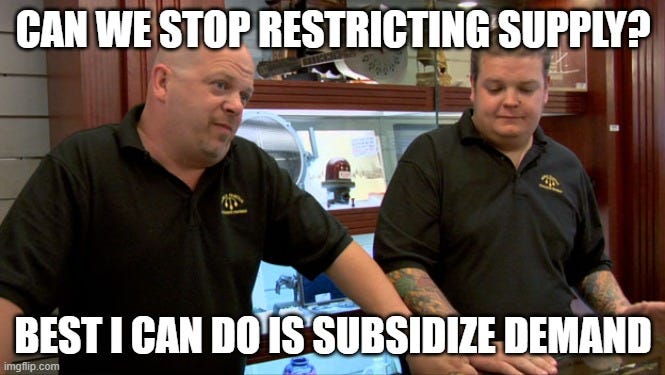
The playbook never changes. Restrict supply and subsidize demand.
Not only do we subsidize demand, we do so via the WIC in a way that forces market consolidation and inflexibility in support.
Supply is restricted to begin with in both classic ways, onerous regulatory requirements and outright protectionism via tariffs and quotas, even with those with whom we have free trade agreements. On top of that the FDA is involved.
If you’re familiar with such dynamics none of this is surprising or all that new. This is written more as a reference post for the future, and for those who are not intimately familiar with how such things work.
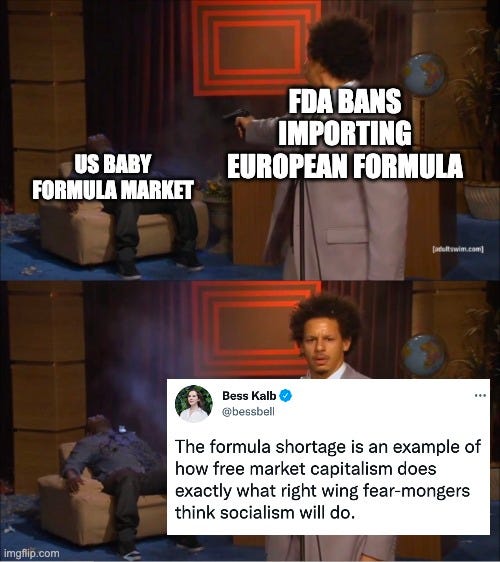
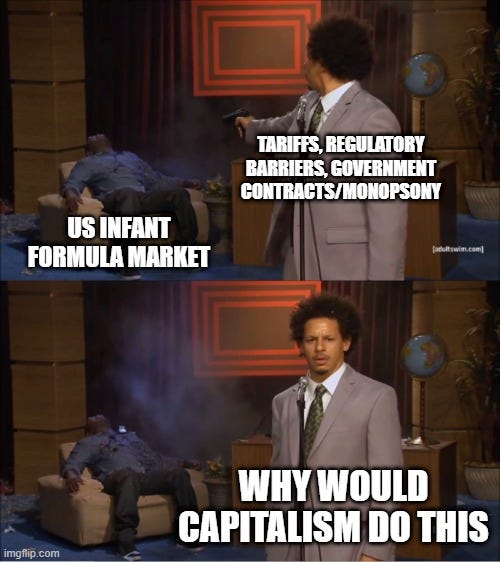
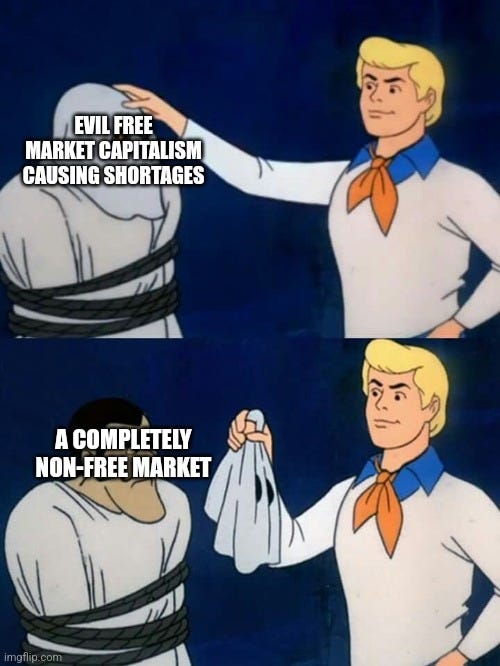

There are a few more I saved for later on.
I am going over this again, now that the full picture is clear and politicians have made various new insane statements, because the situation is so perfect. It’s terrible, in the sense that mothers are panicking and having trouble finding formula to keep their kids alive. I’m quite unhappy about it happening. What I mean is that this is the perfect example of a situation in which all the things our government likes to do combine to create a mysterious completely unnecessary shortage of a vital product via driving out most potential suppliers. Then those forces combine to prevent the problem from being fixed, and those responsible then blame capitalism and corporations for a problem they would have handled quite well if they’d been permitted to do so.
The short term crisis began with the Abbott plant in Michigan being shut down and staying shut down for months. It’s being reopened now, but it will take six to eight weeks to properly resume production and get it onto store shelves – the FDA expects the situation to improve over the next couple of months. That’s the good scenario.
FDA Delenda Est
So it is reasonable to start with asking what happened with this factory.
Why did it take months to reopen a baby formula factory after it was shut down?
One guess. That’s right. The FDA.
They make their priorities very clear, as illustrated in this letter sent to Cafe Hayek.
I’m not sure if the FDA spokesperson meant to be this honest in responding to the infant formula shortage:
“Our first and foremost priority is ensuring that any recalled product remains off the market and we are working with the U.S. Department of Agriculture and manufacturers to ensure that parents have access to alternative, safe infant formula,” the FDA said in a statement to Fox News Digital on Tuesday.
As Ian Fillmore put it when sharing the reference:
Rephrasing that only slightly, “While we are working to ensure parents have access to infant formula, our first and foremost priority is ensuring that any recalled product remains off the market.” Exactly. The FDA does not exist to get products on the market. It exists to keep products off the market. They have no idea how to get a product to market; that’s just not what they do.
When the FDA says they are ‘working to get products on the market’ it means they are hard at work keeping those same products off the market, but they are also considering doing slightly less of that at some point in the future.
No promises.
Here’s a more official, they-posted-this-on-purpose official response.

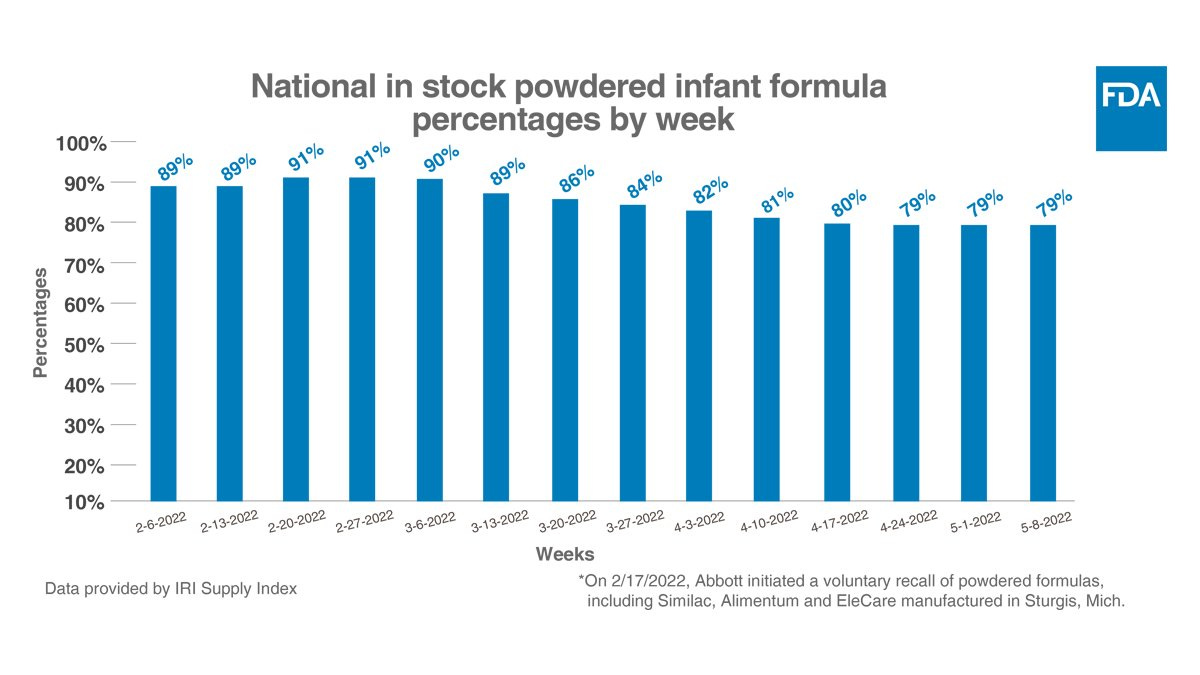
I have no idea where they got the numbers for this graph, but from all the reports of running around desperately looking for formula I have the feeling 79% is not properly describing the situation in question in any practical sense and that this metric was chosen and sculpted to make the problem looks less serious.

I mean if there’s a week that you don’t restock store shelves then there’s nothing on the shelves, but to say this right after a graph that says you’re not making progress, while everyone is screaming that things are bad, seems unlikely to be the smart tactical approach here.

This is the FDA’s message to us. “A product needed for babies to survive, whose supply we have restricted, is selling out and people can’t find any. If you see anyone charging a market-clearing price that keeps it in stock for those who need it most and encourages more supply, please report them right away.”

As one would expect, other suppliers are doing their best to step up, but it’s not easy to ramp up production quickly. I’m guessing being willing to spend more money might help? Perhaps they would be able to do a lot more if maybe, I don’t know, they were able to charge more money for their desperately needed products.
Crazy talk, I know.
The good news is that the plant in Michigan is indeed going to eventually reopen. There is an agreement to that effect Abbott reached with the FDA.
What can we do in the meantime?
The obvious solution when one supplier proves temporarily unavailable is to turn to others.
Thanks to the FDA, it is not that simple.
You see, we must be protected against European baby formula… labeling.


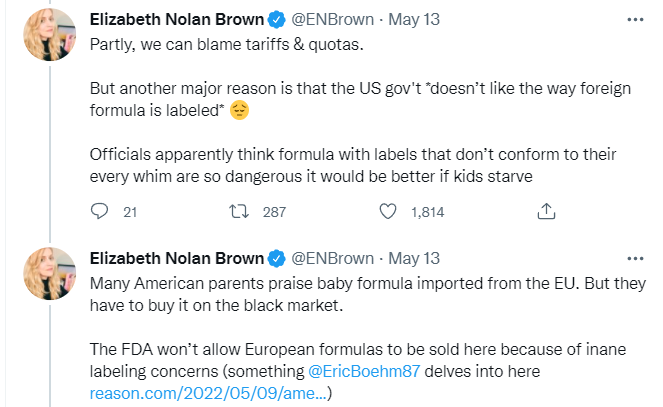
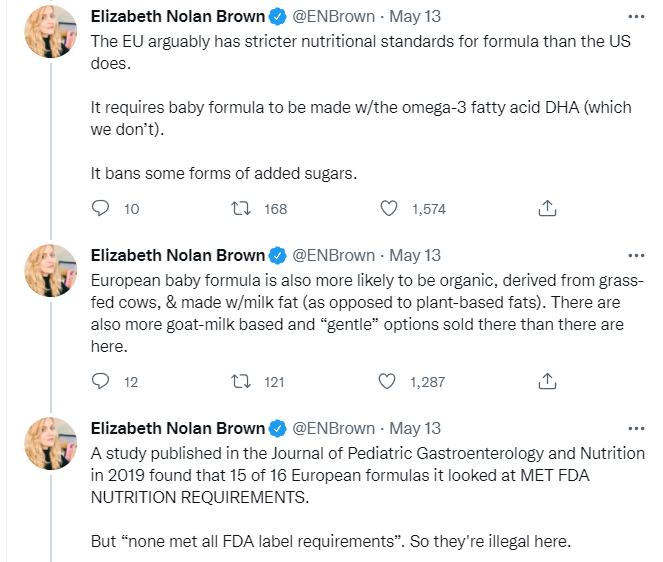
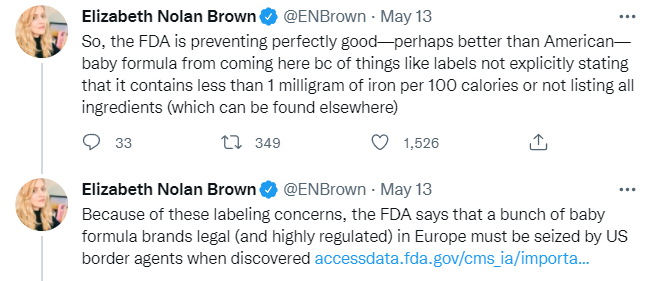
Including the fear that perhaps the label is in German, and how would a family know how to prepare the formula? And don’t say ‘slap a big sticker on it in English’ or ‘still seems way better than not having formula and watered-down isn’t that big a tragedy anyway’ but that’s all crazy talk.
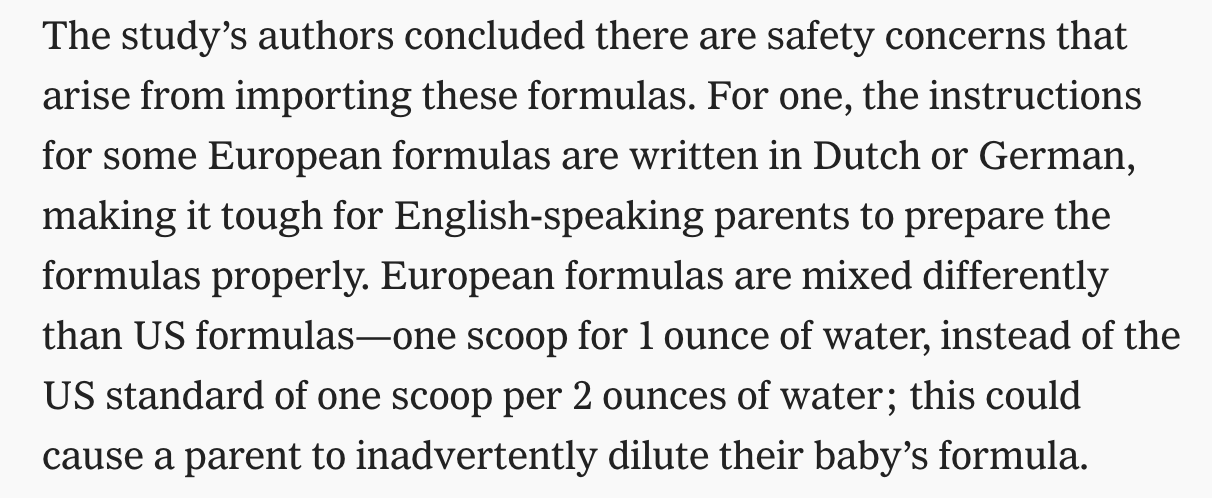
To which this reasonable objection is raised.
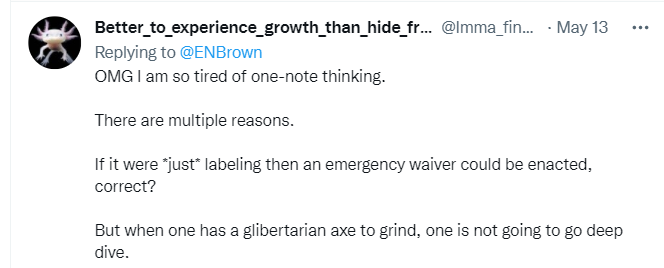
Except, no, the whole issue that no, one does not simply waive labeling requirements, they are absolutely not going to do that even if that is literally the only issue. On the contrary, after months of not budging things got bad enough that they are going to somewhat easelabeling requirements temporarily, and I am pleasantly surprised they followed through on their promises to do everything possible by doing even that.
Since this is, in our reality, pretty much ‘everything possible’:
Under the new guidance, the FDA will decide on a case-by-case basis whether “to allow the introduction into interstate commerce (including importation) of infant formula that is safe and nutritionally adequate, but that may not comply with all statutory and regulatory requirements.” Formula manufacturers can submit safety and nutrition information to the FDA to be granted a reprieve from enforcement of these regulations.
“The extent to which we exercise enforcement discretion may vary,” states the new FDA guidance on baby formula:
For example, an infant formula whose label does not list the nutrients in the order required … would need an exercise of enforcement discretion regarding that particular labeling requirement, and FDA may determine that enforcement discretion is appropriate. In contrast, an infant formula whose level for a specific nutrient is below the minimum that we require or does not contain a specific nutrient we require might not be an appropriate candidate for enforcement discretion, especially if the low level or absence of the nutrient could present a safety issue for infants.
So what they are doing, in an emergency, is allowing, out of the kindness of their hearts, for manufacturers to apply for the ability to temporarily import their products once the FDA explicitly approves them, on a case-by-case basis. When the problem was something completely irrelevant like listing ingredients in the wrong order, the FDA plans to (eventually) approve such an application, which will be good until November. If the issue is a trivial argument over something other than labeling, well, tough.
Or, another way to put it is this.


If I was a European manufacturer, saw these rules, saw that even these ‘relaxations’ were temporary and knew I couldn’t charge more than the non-shortage market rates, would I apply for FDA approval here? No, I most definitely would not.
Labeling is, of course, not the only issue. There are quotas and tariffs, differing detail requirements, and once one is not going to be bringing a product to the American market there are going to be a bunch of detailed technical regulatory reasons why one does not simply bring it into market right away.
What does an (unusually sane, even) former FDA head think of the situation?
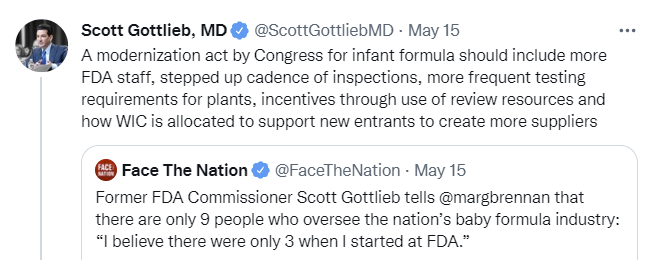
The problem, you see, is that we don’t have enough oversight. If we’re going to ensure a totally unfree government-run market perhaps we do need more than nine people. The government isn’t doing enough to fix the problems that it is directly causing, like encouraging new entrants. If you want WIC to encourage new entrants, perhaps let those in WIC simply choose which baby formula to buy, at least from among those FDA approved?
Is this all pure regulatory capture? Yes. Absolutely.
Could all of that be hand waived away in an instant if someone who thinks like I do was in charge of such decisions? Yes. Absolutely.
I am not in charge.
Of course, if I was in charge these rules wouldn’t be there in the first place. If formula is good enough for Canadians or Germans it’s good enough for Americans.
By all accounts, European formula is if anything superior to our own, yet even in an emergency causing major political embarrassment and potentially starving babies, we can’t even waive such rules temporarily.
Another good question is why the market is so concentrated that shutting down one plant threatens the whole supply.

Under normal circumstances, there being only four total manufacturers would be cause to worry about a monopoly and to wonder why we weren’t ensuring competition.
Whereas in addition to shutting the foreigners out almost entirely, which also has the effect of discouraging foreign capacity, the government is also directly responsible for the consolidation in the American formula industry, due to the WIC.
WIC and the Pre-Existing Market
WIC is the Special Supplemental Nutrition Program for Women, Infants and Children. It ‘provides free healthy food and services to low-income women and their children, including nutrition counseling, breastfeeding support, health education, and referrals to other programs and services.’
WIC is responsible for about half of all formula purchases.
The obvious response is that it would be far better to give parents money, and then let them decide for themselves what to buy, but given people hate giving out money, giving out in-kind goods and services seems far better than doing nothing. Not the most efficient option, but seems like a reasonable compromise.
The problem is that the government purchases its formula via statewide contracts, and thus severely restricts which formulas parents can buy. Which, given the FDA has to approve any formula sold, is kind of odd. If you win such a contract to be the one who captures this half of the market, your sales in the state jump 300% and you have a huge competitive advantage. If you can’t win those contracts, you can’t compete. Thus, forced consolidation to be able to compete for the contracts.
The advantage of doing that is that the government can drive a hard bargain and reduce the price, and does. Companies even take a loss on the WIC contract in order to get into prime position in the other half of the market. Which is good if you want the government to pay lower prices. Less good if you want a competitive market with lots of capacity. It’s a trade-off.
There is also, of course, the need to deal with all the exacting demands of the FDA.
Which is another reason to consolidate. FDA requirements impose large fixed costs to how you do business and also in ‘dealing’ directly with the FDA itself. Once again, small competitors can’t compete and potential new entrants stay away.
When you make success dependent on who can make a deal with the government, when it’s who you know and you need to deal with high fixed costs, insiders prosper at the expense of outsiders.
Thus, it is no surprise that things were already on shaky ground before the Abbott plant closed, although they then rapidly got worse.
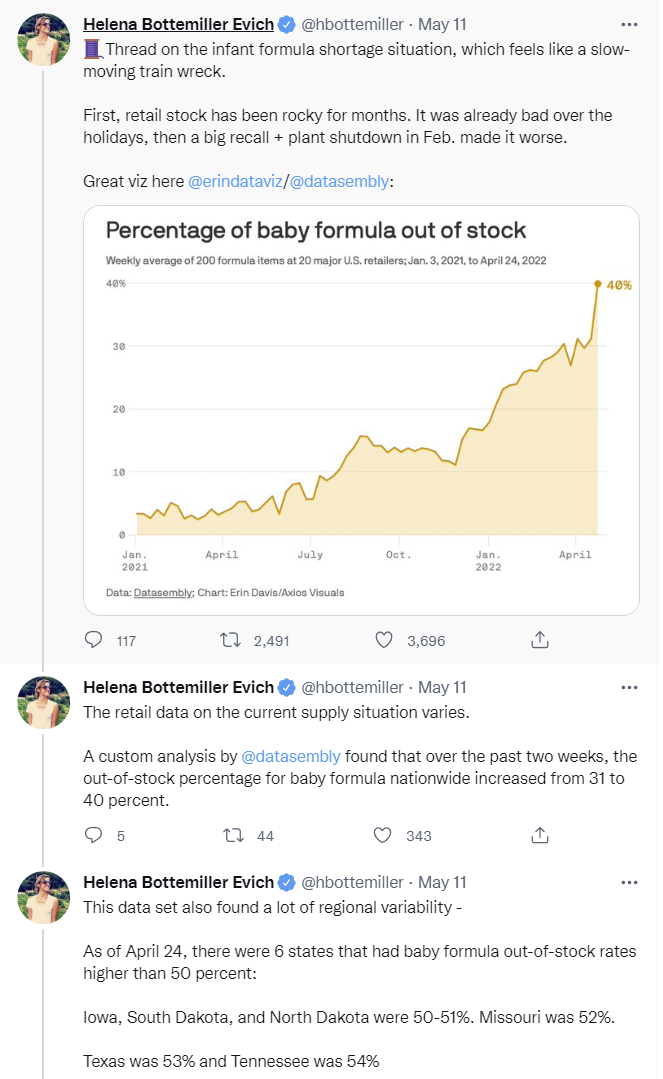
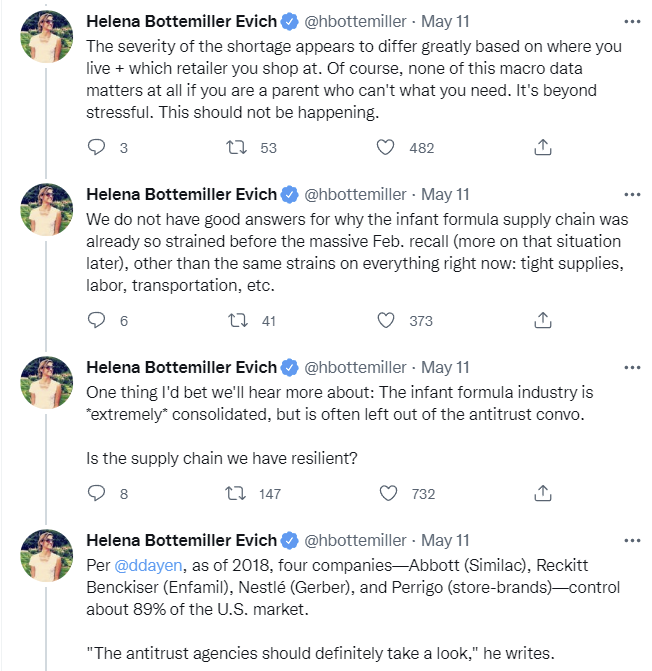
I agree that this is an unacceptable level of industry concentration and the antitrust agencies should take a hard to look at what the protrust agencies are doing.
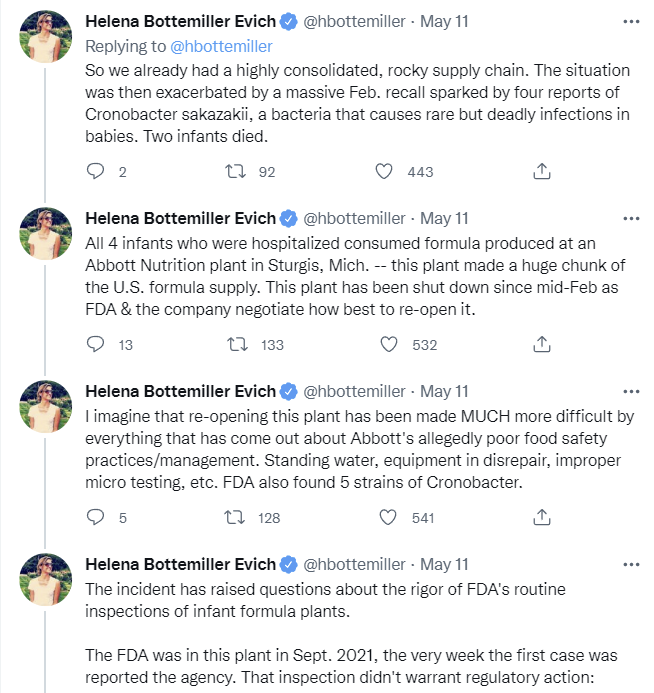
So essentially we went from ‘we basically don’t care what’s going on at the plant so long as there are no problems’ to ‘now that we have an issue we need to solve all of these problems that we wouldn’t otherwise even notice’ and that led to extensive negotiating around what needed to be done. Negotiating what needs to be done necessarily means sitting around not, until those negotiations finish, doing the things that end up ‘needing’ to be done.
If the regulations were of good form there wouldn’t need to be a ‘negotiation’ because there’d be very clear rules and nothing left to negotiate. If there is a negotiation, either the FDA is claiming the right to make arbitrary demands, there is no way to know when you’ve done what the FDA requires without getting them to say so, or Abbott actually can’t satisfy the requirements of a safe plant and the FDA is finding a way to let them operate anyway.
Of course, one could say that 40% of all formula being out of stock is a little bit bigger of a deal than the original problem and this problem could be settled by liability and reputational damage. We don’t live in that world.
The Biden Administration is, months in, suggesting that states ‘allow WIC recipients to buy whichever formula products are in stock’ and also this gem.
“And, USDA is urging states to relax their requirements that stores keep a certain amount of formula in stock. This will offer relief to retailers and allow companies to manage inventories to meet demand.
I can’t sell you the last item. If I did, I’d be out of stock.
Pro Trust Versus Anti Trust
You’ve intervened in the market to encourage consolidation and favor insiders over outsiders via onerous regulations, government contracts controlling half of all sales and effective bans on any imports. There’s a shortage. What will you do now?
Call the CEOs of the formula companies before Congress. That is definitely what they should be spending their time doing right now.
Also: Study this stunning lack of competition in the market, of course.
Sen. Tammy Duckworth (D-Ill.) on Thursday wrote to Federal Trade Commission Chair Lina Khan asking for a “wide-ranging study” of market dynamics and competition in the infant formula industry.
…
“Shedding light on the business practices and market conditions that led to sustained infant formula shortages will enable Congress and regulators to develop effective legislative and regulatory responses to strengthen the resiliency of the infant formula supply chain and prevent future infant formula shortages,” Duckworth wrote.
There’s business practices and then there’s market conditions. The business practices are largely in response to the market conditions.
That’s not to excuse Abbott’s safety failures, which of course should be investigated. But that would be true regardless of the shortages. The ‘business practices’ that matter here are the consolidation into four companies, which in turn is the result of the ‘market conditions’ the government created. Which, of course, are likely in turn largely caused by regulatory capture from the formula companies.
Protrust government policy went pretty far. In particular, we made sure under Trump to shoot down this Worthwhile Canadian Initiative. We don’t only want market power over the domestic market and to bar foreign producers from entry into America, we are sabotaging foreign markets and production as well (here’s a link to the document Fang refers to).


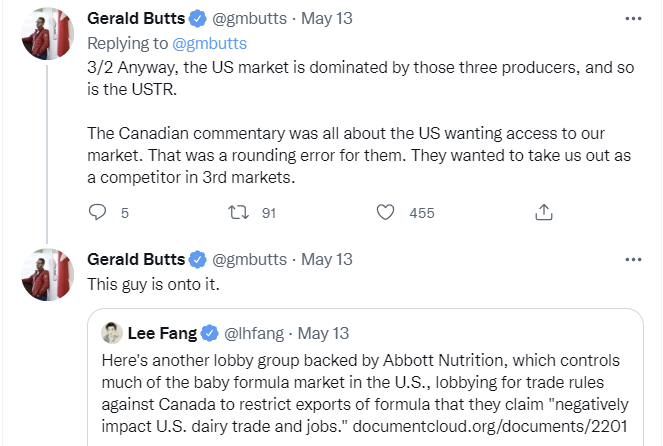
It would actually be pretty great if one actually did investigate the dynamics involved in more detail, and suggested solving the actual root causes of it. Alas, I have a feeling such an investigation would be ordered to treat the WIC structure and lack of possible imports (and our sabotage of foreign production as well) as givens rather than variables, and thus reach the conclusion that it’s those greedy corporations that care about profits rather than people causing all this trouble when they should instead… I don’t even know exactly what anyone would want to be expecting here. But presumably the demand wouldn’t be anything to make the situation better.
Still, someone really ought to do an investigation. Although a lot of people already did, and are happy to share the results, if anyone wants to listen.
Senator Mike Lee is proposing sensible practical actions, because it is just our luck that the senator most prominently proposing lifting stupid barriers to trade (he also proposed good legislation on the Dredge Act and Jones Act) is for very legitimate unrelated reasons also one of the most hated senators.
Then again, the other advocate of that I know about in the senate is Ted Cruz, which implies that the being hated thing isn’t a coincidence. A better front person would be nice.
Here’s what Lee proposes in The Formula Act:
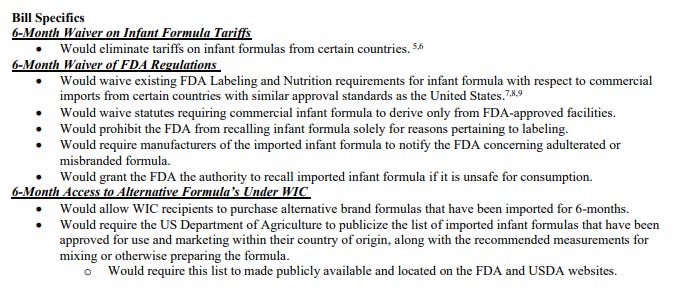
We do have at least a house candidate. Here is Suraj Patel, who is running for Congress in my district and only narrowly lost last cycle, being remarkably reasonable in the New York Times and on Twitter about what we might do. I’m going to meet with him next week, cause this all seems great. Patel has even come out in favor of building more housing, so he is most definitely One Of Us. There are a number of other signs as well.
We Must Do More
What is the Biden Administration doing to address the situation?
For the first few months, it seems, they did essentially nothing. There was an inevitable crisis coming, because demand exceeded supply and existing stocks were being run down with no timetable to get the Abbott plant back. Biden waited until the shortages mounted up.
This is way way less bad than it is in an exponential growth situation like a pandemic. In a pandemic that doubles every few days, if you wait until you have a problem then, as we have found out multiple times, it is far too late to do most of the things that were previously worth doing.
In this case the problem grows in more linear fashion, so if most of the problem lies in the future there’s a very good chance there’s still time to prevent most of the damage.
I’d still like ‘we shut down one of the four sources of baby formula for an indefinite period’ to trigger some alarm bells?
That’s the kind of request the Biden administration would call ‘mind reading.’ Who could have predicted the shortage of baby formula? There’s this clip asking Pete Buttigieg about the quote that ‘if we’d been better mind readers I guess we could have done something earlier.’
Why exactly does this require a mind reader? Why couldn’t you have done something earlier, sir? Why is that an unreasonable standard?
One could indeed say ‘why did they cut the clip before Pete could answer?’ That link leads to the full clip.
Pete Buttigieg’s answer here is pretty great politics and reflects detailed knowledge of the situation. He’s pretty great at this, and he cares about details, and this is mostly the best possible version of the thing that it is. I don’t know how to give a better answer in Pete’s shoes. You love to see it, and it makes me wonder what Pete (who is the Secretary of Transportation and thus has zero actual authority over the situation) would do if he actually got to make decisions instead of defending the decisions of others.
I’m breaking the answer down in detail because it is worthy of that breakdown, and it illustrates the perspective so well.
Pete’s direct response is no, they’ve acted ‘from day one.’
He starts by saying they moved to create more flexibility in the WIC program, as noted above. That’s indeed a good first move, mitigating the damage from dumb rules, but anyone on the ball enough to know to do that should be able to do the math and know it will buy some time but won’t be enough on its own.
We are also considering other things, he says. We are increasing other domestic production and are ‘looking at imports.’
Increasing domestic production elsewhere is good, although the ‘watch out for price gouging’ stuff is definitely not helping speed things along on that front.
Alex Tabarrok at Marginal Revolution, while sighing at the thought of repeating all the same points as always, points to implicit price controls like fear of being called a price gouger or other backlash as a potential explanation for regional variation in the shortages. The shortages are extreme in some places and absent in others because prices can’t properly adjust. This seems right to me.
And I suppose looking at imports is better than not looking at imports.
Pete’s core argument is to go on offense and blame Abbott: “We are here because a company was not able to guarantee that its plant was safe.”
Yes. We are here because one company was not able to do this to the satisfaction of the FDA, the FDA has thus shut them down for months, and that was enough to trigger this level of problem. Which it really, really shouldn’t be. And even if it was enough, there were months in which to solve the problem, during which you ‘looked’ at imports.
The argument that ‘if someone else had done their job we wouldn’t be having this conversation’ can be important information but it is also not a valid excuse for it also being true that if you had done your job we wouldn’t be having this conversation.
This company, which ‘seems to have’ 40% market share (again, how did that happen?) ‘messed up’ and is ‘unable to confirm that a major plant is safe and free of contamination.’
Notice once again that language. They can’t guarantee or confirm that the plant is safe and free of contamination.
That’s very different from an assertion that the plant is unsafe. The argument isn’t over whether the plant is safe, it’s over how to demonstrate that the plant is safe to the FDA. Abbott wasn’t doing proper maintenance and safety work before, but given the scrutiny and liability regime they’re about to be under, they have plenty of incentive to get it right. The mindset difference here is important.
He then says ‘obviously the most important thing is to get that plant in Michigan up and running.’ If that was true, they’d be willing to compromise on proof of safety or even to some extent on real safety to get the plant started faster. So what looks like the top priority is enforcing a super-high direct safety standard on the plant while putting babies across the country at risk to do so. When you say as he does ‘it has to be up and running as soon as possible and it has to be safe’ then you have a trade-off you’re refusing to acknowledge. All of which is being used as a blame game here, to ensure that it’s all Abbott’s fault.
He then says this is the difference between a ‘supply’ problem and a ‘supply chain’ problem. That’s an important point, but only if you take ‘supply’ to mean ‘domestic supply’ because we’ve automatically ruled out other supply. If you consider that our ‘supply chain’ to get formula from Europe is we intercept it at the border and impound it, then we very much have a supply chain problem. One can solve a supply chain problem by having more supply available at more convenient parts of the chain, to take pressure off the chain. Or one can solve a supply problem by improving the supply chain, and using alternative sources of supply.
As I said, it’s actually a damn good answer given the circumstances. It’s technically accurate, it’s detailed and specific, it shows concrete useful steps being taken, it goes on the offensive against a blameworthy target. The only way to give a better answer would be to be doing a better job solving the problem. That’s not up to him.
Were they acting from day one, as they often claim? Let’s go to the administration’s own telling of the story to get the context of that ‘mind reading’ claim, and, well…

President Joe Biden on Friday defended the White House’s response to a months-long shortage of infant formula in the United States and dismissed the idea that his administration should have acted sooner, saying they “moved as quickly as a problem became apparent to us.”
Following remarks in the White House Rose Garden, Biden pushed back when asked if the administration should have reacted faster to shortages of baby formula nationwide, telling CNN’s Jeremy Diamond, “If we’d been better mind readers, I guess we could have.”
When did the problem ‘become apparent’ here? If the answer is ‘the day the plant shut down’ then it’s a very odd turn of phrase. If it’s later, then that’s that. If it’s earlier, then they should say so and I will agree their mind reading game is pretty good.
I also love the next line so much.
The President later said resolving the issue requires that the federal government “move with caution as well as speed,” adding that it was important to “make sure what we’re getting is, in fact, first-rate product.”
What’s an emergency? What’s a trade-off?
To summarize efforts after the problem became apparent (whenever that was), as the assistant White House press secretary tells us, they are here to tell us they are leaving no stone unturned.

No stone unturned. Official White House sources confirm that they have identified all the stones one might turn, and that they have turned them.
The link he offers says that they are working with retailers and one of the few remaining additional manufacturers to get product onto store shelves by ‘removing supply chain bottlenecks’ and other neat stuff like that. Command economy stuff. This does not seem like a problem that requires such solutions – if there is a lot of demand and not enough supply, and you can ramp up supply, you’ll ramp up supply. If the supply isn’t distributed correctly, I trust Target and Walmart to figure out how to fix that. It’s kind of their thing.
Then again, if you don’t want to simply pay for this to happen and also you treat any attempt to profit from the situation by charging market clearing prices as ‘price gouging’ then you might be locked into needing to coerce a response instead.
One might say there are rocks like ‘buy the thing you have a shortage of on the world market’ or ‘reduce regulatory barriers restricting the supply of the thing where you have a shortage’ and you might want to work harder on turning those. There’s also ‘take less than four months or so to even reach an agreement on what Abbott has to do to restart its factory.’
And of course as discussed below, there’s ‘encourage substitution out of formula for babies old enough for that’ but that’s a hard message to have to give since it means admitting there’s a problem, and that some people will have to go without. In some circumstances admitting you have a problem is the first step, but not here. It’s hard to ration things that people feel they need, which many of them actually do really need to have their babies not die, and for which you are thus understandably unwilling to raise prices.
And of course, when all else fails, you can always declare defense production act.
Farmer Hooch @CompanyHoochI will now never think of anything else but this for the DPA and I hate @scottlincicome for that. https://t.co/W0o8QGRN7f Fox News @FoxNewsBREAKING: Biden invokes Defense Production Act, ‘Operation Fly Formula’ to address shortage https://t.co/lIkKng0cfcMay 18th 20225 Likes
@CompanyHoochI will now never think of anything else but this for the DPA and I hate @scottlincicome for that. https://t.co/W0o8QGRN7f Fox News @FoxNewsBREAKING: Biden invokes Defense Production Act, ‘Operation Fly Formula’ to address shortage https://t.co/lIkKng0cfcMay 18th 20225 Likes
Operation Fly Formula is going to be flying in baby formula from overseas.
The White House said DOD will use its contracts with commercial air cargo lines, as it did to move materials during the early months of the COVID-19 pandemic, to transport products from manufacturing facilities abroad that have met Food and Drug Administration (FDA) safety standards.
That’s in case anyone was wondering if we have a free market in baby formula. Also, that last line isn’t going anywhere, so…
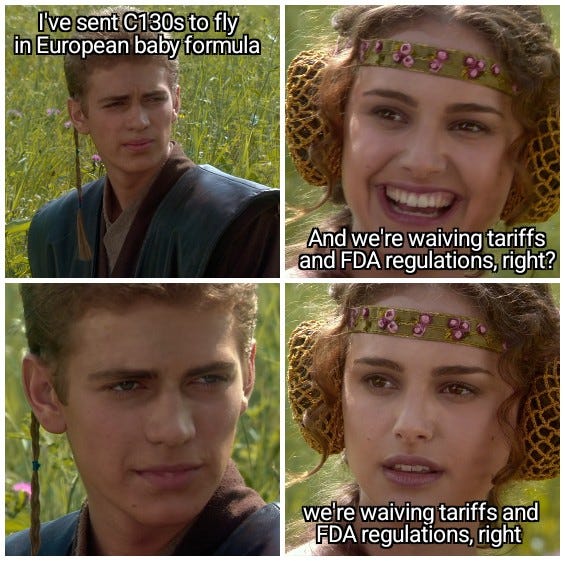
Yeah, no. We are continuing to not do that.
Actually, you know what we are doing instead? We are continuing to intercept European baby formula that people try to import, and impounding it.
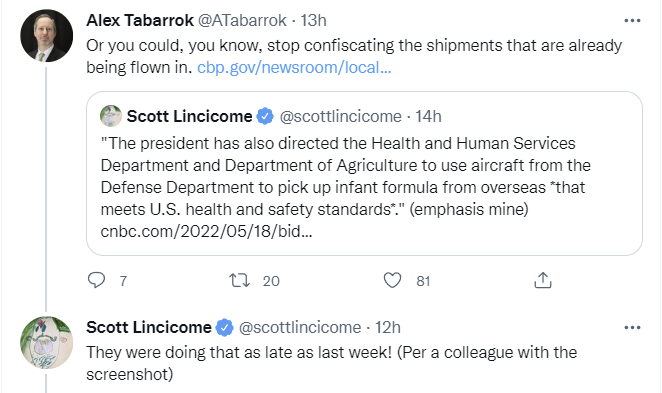
Then they celebrate, in ways that sound a lot like drug busts.
Have we considered offering to pay money for baby formula that meets European safety standards and then letting ordinary commercial businesses take care of the rest? Or even not stopping them when they try to do it? No, I didn’t think so. Defense production act.
So, why didn’t they act earlier? Here is one model, mentioned while discussing the administration needing to ask Congress for $28 million ‘for the baby formula shortage’ because they’re trying to solve it through central action rather than lifting supply constraints or fixing rule sand incentives, and almost all the Republicans voting no.
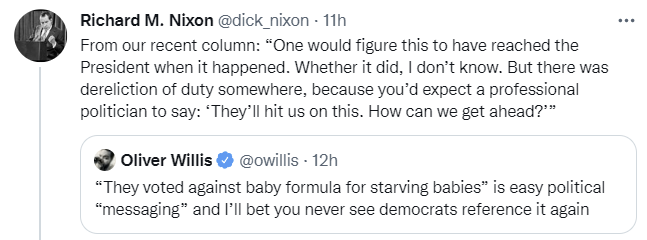

It’s that second one. They assumed months ago that they couldn’t be blamed for something that ‘isn’t their fault.’
So two things to know.
One, if you’re the President, you get blamed for everything, no matter what. It doesn’t matter if it is ‘your fault.’ And this is why. Regular people don’t have the ability to differentiate what is and isn’t ‘your fault.’ Thus, when they can’t buy baby formula or there’s lots of inflation, if you’re in office? Congratulations, it’s your fault, and they’re going to punish you accordingly.
This is indeed correct strategy. First best is to have a better model, but this is not a reasonable or realistic ask. Barring that, it is good to go purely on outcomes. Yes, sometimes there will be blame that isn’t deserved. But much better to have the right incentives going forward. This illustrates that. If you’re the Biden administration, you shouldn’t not do anything because the problem isn’t your fault. It’s still on you to fix it. If you don’t want the job of fixing a bunch of stuff that isn’t your fault then public service is not right for you.
Second, this is totally their fault. Not in the sense that it isn’t the fault of the FDA or Abbott or our trade policy, and not in the sense that they actively made any of those things worse. There’s certainly plenty of other blame. But in the sense that they had the power to do something about it, including after the Abbott plant closed, in plenty of time, completely painlessly, and didn’t do so? Yeah. That.
The Starving Babies Caucus
No matter what else you say about the Biden Administration, I am confident they are not in favor of literally starving babies to death. They’re not as fully committed into the anti-babies-starving-to-death camp as I am, but if there was a knob that said ‘starve [adjective] babies to death’ I am confident that no matter what the adjective was they would turn the dial as far as they could in the ‘don’t starve any babies’ direction.
And I am confident that if they had the option on whether or not to starve any particular baby to death, they would choose not to do that. I believe they would do so even if it meant they would ruin their expensive coat. They might not go about it the way I would, but at least there’s that.
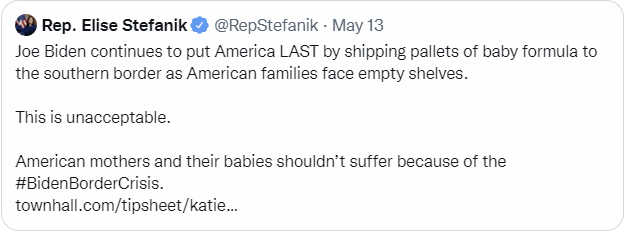
When we ship pallets of baby formula to the southern border, we are giving that formula to babies that we are detaining. If we do not give those babies formula, then those babies will die.
Thus, this is an explicit call to starve certain specific [adjective] babies to death.
One could reasonably object that this framing is not fair. No, you would say, this is not the pro-starvation position. This is merely the insufficiently-anti-starvation position. It says that other priorities come first, that’s all. We’re very sorry for your loss.
And yes, that’s fair. We cannot, from the evidence presented, differentiate the pro-[adjective]-baby-starvation from the insufficiently-anti-[adjective]-baby-starvation positions. One could even argue that it’s clearly the second one, because when we did have enough baby formula for everyone (wow, the sentences one types these days) they were continuing to support shipping baby formula sufficient for the needs of the babies in question. So I suppose, again, there is that.
It is still, as they say, quite the take, and quite the political strategy.
Here’s Fox News with a segment taking the same point of view. Contra to the source I wouldn’t call this perspective ‘maximally evil’ due to having had two years to expand my imagination in such matters. That clip does have an interesting unrelated assumption in it – that if Psaki’s claim that they were ‘working on the problem for months’ were true that there then wouldn’t be a shortage. Yet we should consider that perhaps that is not actually true. That the ways this type of thinking is allowed to ‘work on’ the problem are not capable of solving the problem within a few months, or at least incapable of it until the situation reaches crisis levels. That is what my model outputs here.
Here is a statement from the Governor of Texas.
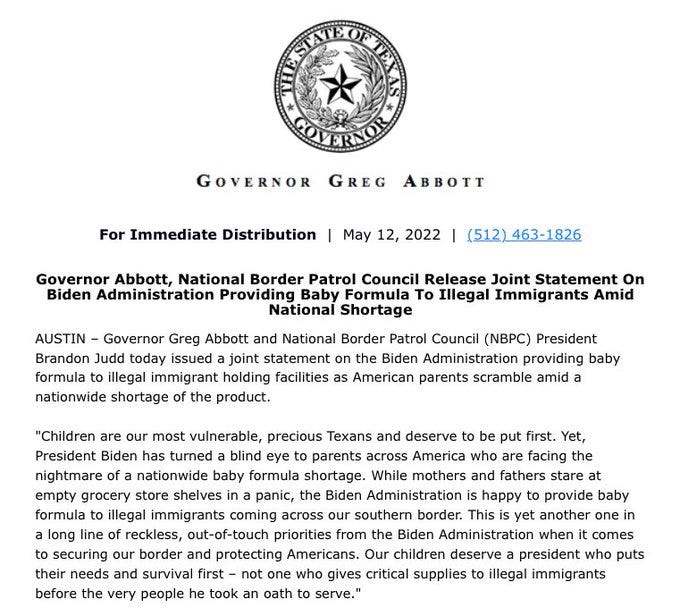
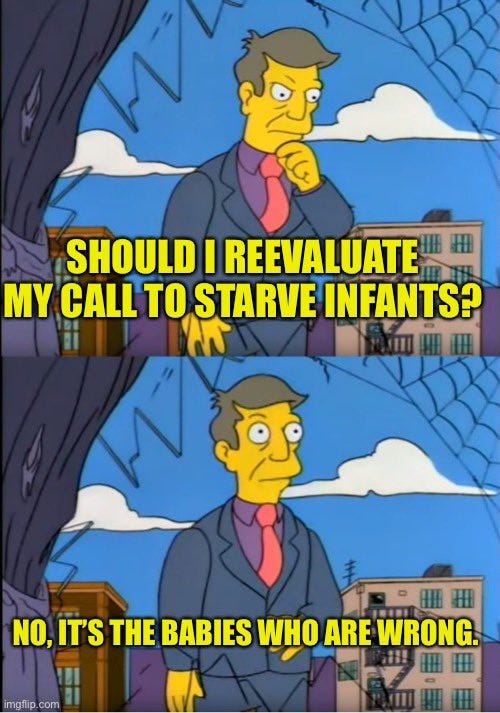
What I’d like to see is a call for us to buy formula from Mexico and use that formula at the southern border.
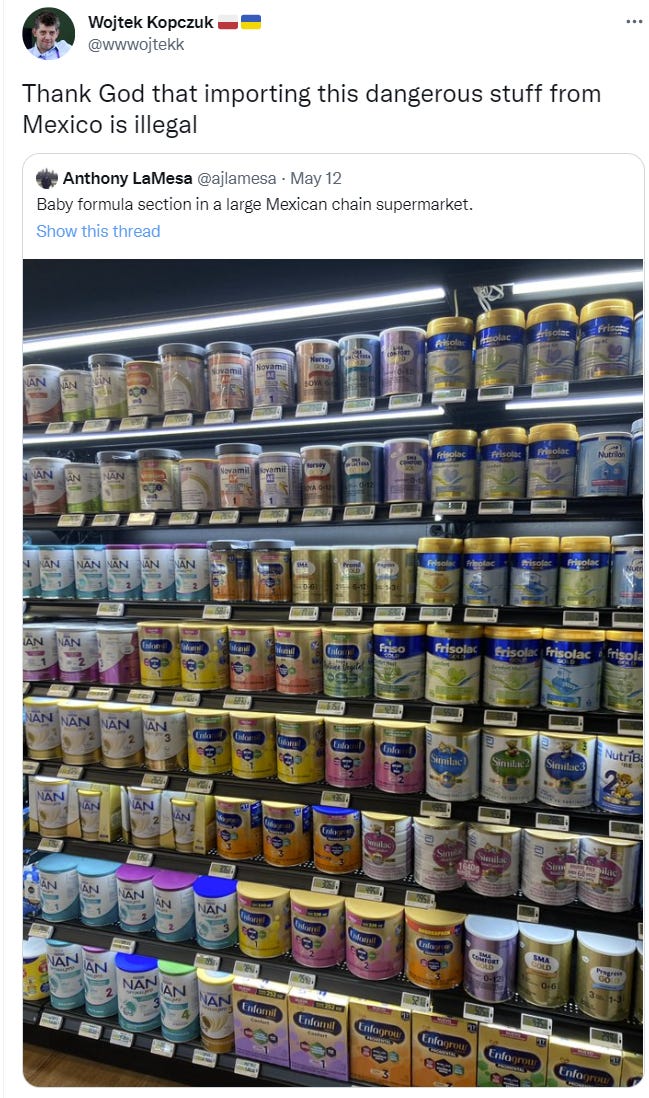
Because the logical knots this ties various people into is hilarious. Mexico, you see, does not restrict imports of baby formula, so they are fully stocked and could easily handle our orders, and their babies seem to do fine.
Practical Considerations
It’s a scary time to have an infant. Luckily the FDA is here to help with a fact sheet on how to deal with the shortages that the FDA created.

The official recommendations aren’t wrong but could, perhaps, be more helpful.


I would indeed try all of those things, but yes, not helping all that much, thanks.

I would totally make the phone call to ask the pediatrician, but the ‘list of things you must do otherwise you’ll be the one we blame’ thing is very much a central thing going on here and throughout everything to do with medicine and/or kids. If you haven’t done everything on our checklist, no matter how inapplicable or dumb, we’re ignoring your complaints and it’s all your fault.
If you did somehow get your hands on some of that illegal European formula, it’s worth noting that not only is it safe, there’s a good chance it’s actively better.

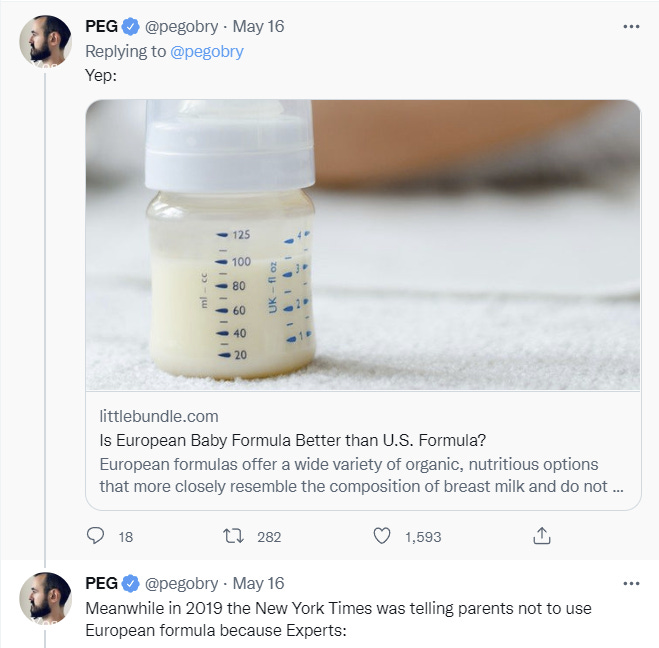
While both agencies have requirements for what’s included in a formula, the European Commission has stricter guidelines about what sources can be used to meet these requirements. They also regulate additional inclusions, exclusions, allowances, formula stages, and certifications.
Nutrient Sources: All infant formulas include carbohydrates for energy and these carbohydrates are typically pulled from sugars and starches. The European Commission has a small list of allowable sources for carbohydrates which include lactose, maltose, glucose, maltodextrins, glucose syrup, pre-cooked starch, and gelatinized starch. Notably missing from this list is corn syrup and corn syrup solids, which are often the primary source of carbohydrates in US baby formulas. Additionally, the European Commission requires that at least 30% of carbohydrates in infant formula come from lactose, as this is the primary carbohydrate source in breast milk. The US does not have this same requirement, and some US formulas contain little or no lactose at all.
You can read the whole thing for several other reasons why Europeans would want to keep away from dangerous American formula far more than Americans would have any reason to fear European labeling mistakes.
If you read more in that thread, there’s discussion of a NY Times article about why it would be dangerous to allow European baby formula, and it’s… really something. The insane troll logic is strong. He calls it ‘pure insanity’ and he’s right. Click through to the thread if you want the full story.
Here’s Perry Metzger also pointing out that the whole thing is pure regulatory capture, with the FDA doing the work of excluding the competition so that more profits can be made. None of this is a coincidence.
I kind of wish I didn’t know about the superiority of European formula, since it now means I have to feel a non-zero amount of bad for not finding a way to get European baby formula.
In a sufficiently dire emergency, one potential action is making one’s own formula. That used to be a reasonably standard thing to do.
If you’re looking to make your own formula, I don’t have a recipe for you, but I do know that Facebook is doing its part by censoring at least one vintage recipe largely because it contains the ‘disputed ingredient’ of Karo. Which is corn syrup. Which we in America still use in baby formula. Market and speech might not be so free these days.
But also because it hasn’t been ‘evaluated by governing authorities’ and as we all know, saying you can do X to create Y is false if experts haven’t verified your claim.
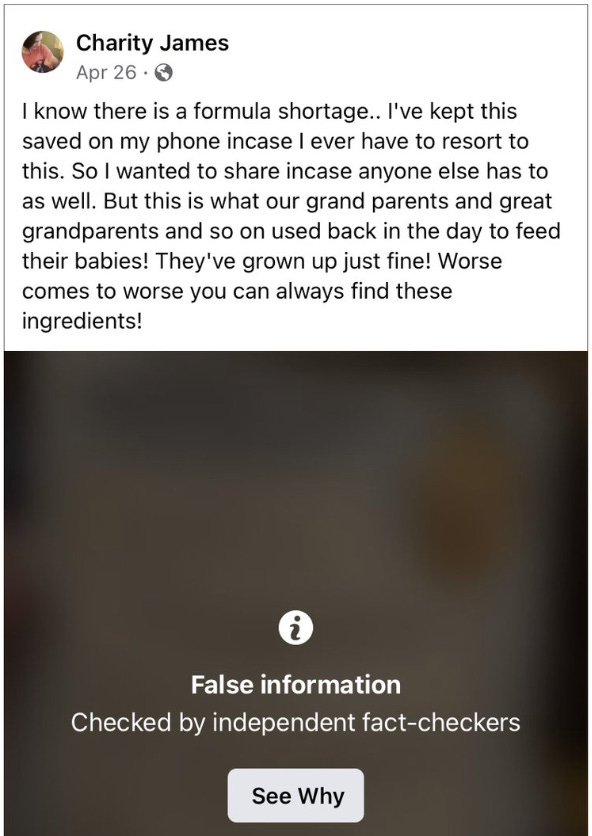
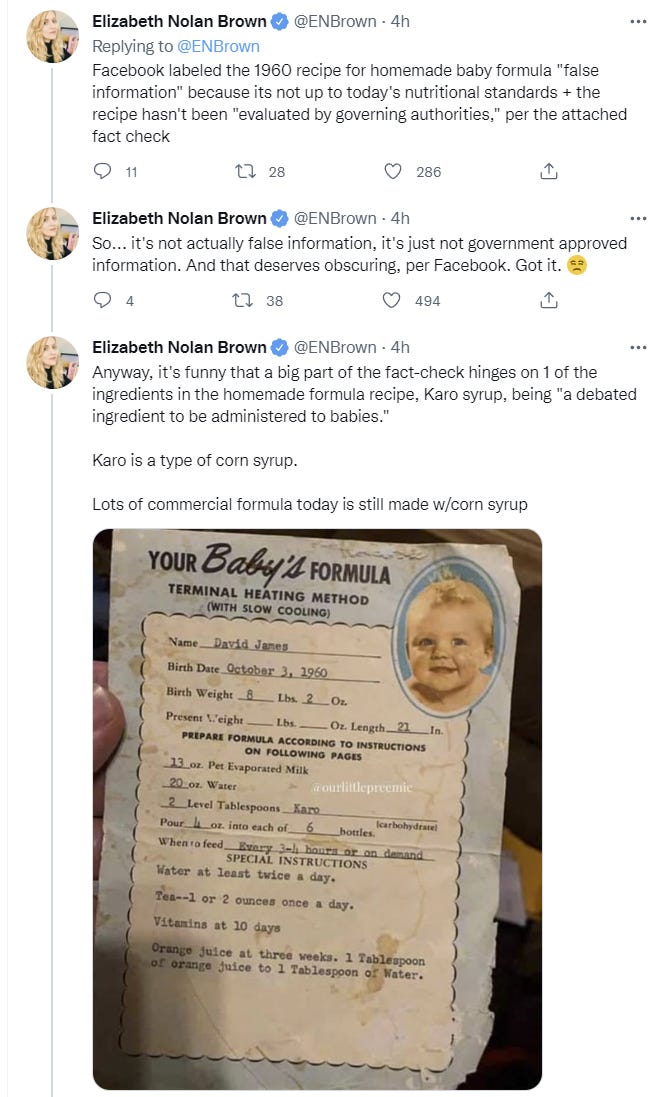
There are a bunch of websites that suggest what to do if you need to make your own formula. One thread suggested this one, another this one, both of which I have completely not checked because the point here is that such solutions existed in the past and haven’t stopped physically working. Please please do not make formula yourself based on a link you find here, if you must go down that road (and you totally don’t need to do that especially if you’re reading this) you need to do your own research on that and find people who understand that angle. I have no idea what the right answers are here and I’m not trying to figure it out either.
As it turns out, you know what else you can give to a ten month old if they have the good fortune to be Canadian? Milk.


The American Academy of Pediatrics got this one right, to their credit, but that’s not the way things are being framed so word does not seem to be getting out very well.
Also in many cases solid foods. There are a bunch of options. If we have a genuine shortage of baby formula, the rules that are currently focused on things like ‘simple guideline people can understand and not stress out about it’ give way to practical considerations. As Matt points out, if you switch out of formula at 9 months instead of 12 months, you save a lot more than 25% of formula you were using, because larger babies need more formula.
For younger babies, that won’t work.
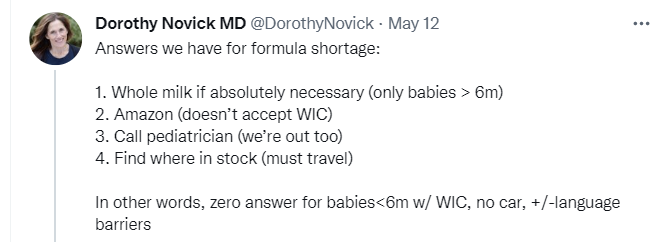
It would work if others substituted out to free up what’s available, but what parents are going to go to emergency rations in order to take one for the team, especially if you’re not willing to be loud about the situation? Not many, even of the ones who know the situation.
Of these four options, the obvious one to solve is the second one. If one were to, say, allow parents to exchange their WIC vouchers for money then they could use that money to pay Amazon. I know, I’m crazy.
As for alternative solutions, the FDA’s job is to stop people from doing things, take one more in the replies.
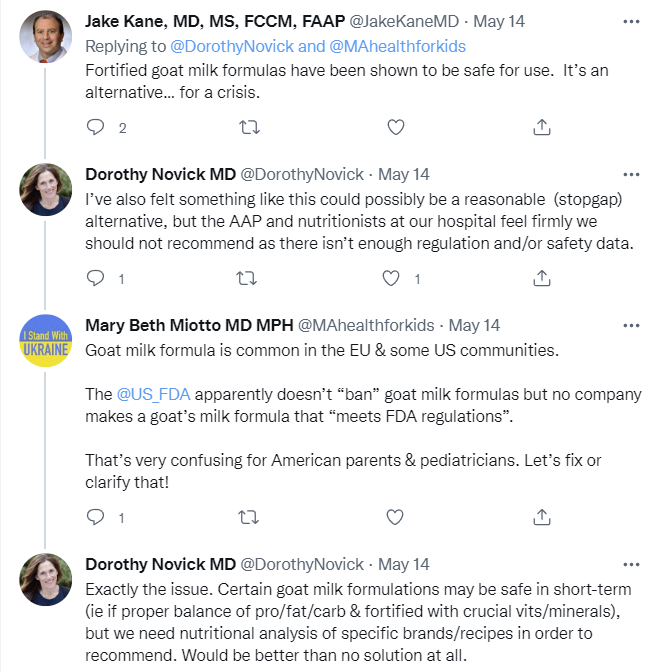
Once again, sure, we’ve got a potential partial solution (although not a very practical one compared to the others, I don’t see how this scales enough to have much impact even if it worked fine), but we can’t prove we have a solution to the satisfaction of regulators in a way that anyone can bankroll.
When you’ve got all these rules in place about what you can’t do, when everyone has to ask permission for everything, you’ve destroyed your flexibility. Through the ages families and villages have muddled through when times got tough, but we’ve put a hard ban on muddling through at scale and a softer but still pretty forceful ban on muddling through without scale.
Which is somewhat helpful under normal circumstances, but if things get sufficiently muddled that you need to be muddling through them then it’s a real problem.
If you have an infant, as I do, should you be worried about not being able to buy formula?
Thanks to implicit price controls, it’s an all-or-nothing situation. You don’t have to worry that the price will rise. You do have to worry about not finding any at all.
My current sense is that if you’re able to go on Amazon, pay retail price without WIC and use one of the standard formulas, there’s no good reason not to keep a bigger buffer in place but you’re not going to have any trouble.
However, if you need a special formula, you are potentially in quite a lot of trouble, and I would absolutely be panicking if that were the case.
If you don’t need something special but do need to rely on WIC, which limits your purchases, it’s somewhere in the middle. Chances are it will all be fine, but those chances are not 100% and there are a few months before things clear up (even assuming things go smoothly from here, which they probably will.)
Conclusion: What Now?
On a personal level the next steps are clear enough. On a societal level, we’re going to get a bunch more of the blame game, and a bunch more of symbolic actions that don’t do that much while the important regulatory barriers remain in place, until a few months from now the shortages probably and hopefully clear up.
There will be various ‘investigations’ that will likely cause the market to become even more fragile. Thanks to the power of the dairy industry and the universal appeal of protectionism and ‘regulation’ of those things too important to allow their markets to properly function, I don’t expect any serious movement towards things improving.
If there’s a much worse crisis down the line and we’re looking at babies actually dying of starvation, maybe we’ll waive some pointless regulations. We ran the test with Covid and mostly went with the ‘let people die’ plan, but the timing is better here and hopefully babies get more consideration. You got to keep hope alive.
Everything Everywhere All At Once
The goal of all this was to put down, while things were fresh, a record of everything involved here, as an example to draw upon in the future.
The point is not that the formula market is uniquely screwed up. I don’t agree with statements that this was a ‘perfect storm’ of problems. Yes, all the classic problems showed up, but that’s the point. They usually show up. This situation is not the exception, this situation is the rule.
I talk about some problems being ‘too important to solve.’ Similarly, some goods are too vital to robustly or efficiently supply. The more vital the good, like baby formula, the more we mess with things, the more screwed up things get and the more fragile and dysfunctional the results we get.
We don’t have a baby formula shortage because we don’t value baby formula. We have a baby formula shortage because we value baby formula.
Generalize.
9 comments
Comments sorted by top scores.
comment by JenniferRM · 2022-05-21T02:42:06.621Z · LW(p) · GW(p)
I appreciate the good works Zvi. Your writing sort of tears at my soul sometimes, because it rubs my nose in the existence of people who I would like to delete from the halls of power, and yet it would be immoral and counter-productive to delete them by direct methods, and indirect methods are SO SLOW and SO UNCERTAIN TO ACTUALLY WORK.
We do have at least a house candidate. Here is Suraj Patel, who is running for Congress in my district and only narrowly lost last cycle, being remarkably reasonable in the New York Times and on Twitter about what we might do. I’m going to meet with him next week, cause this all seems great. Patel has even come out in favor of building more housing, so he is most definitely One Of Us.
I hope you meet him and it goes well and then I hope (pending your approval) that he wins :-)
comment by jimrandomh · 2022-05-20T00:42:53.789Z · LW(p) · GW(p)
This seems like a clear counterexample to the "invisible graveyard" model of FDA incentives. That model would say that the FDA is incentivized to keep the plant closed, because food-poisoning-for-babies is newsworthy and attributable, but higher-prices-for-formula isn't. But it turns out there was a threshold somewhere, where if the FDA suppressed supply too much, the damage becomes impossible to ignore and the FDA becomes the subject of a proper scandal.
But I think the leadership of the FDA might not know that they're scandalized? There's a weird thing that happens when people need to keep up the pretext of not being responsible, where you can't tell whether they know they're being blamed or not.
Replies from: JenniferRM, AllAmericanBreakfast, MondSemmel↑ comment by JenniferRM · 2022-05-21T02:55:23.863Z · LW(p) · GW(p)
I think the FDA is a cultural silo?
They didn't even start out with any of their existing powers, there was a guy going around measuring stuff (which yay! good job!) who then got government powers and started trying to remove lots of products from the market like some kind of food nazi. The guy flipped around and switched from "telling people about bad stuff in products" to using his new legal powers to take Coca-cola off the market because it had caffeine, which he proved addictive, and but coke won on the defense that just because something is addictive doesn't mean it is automatically bad, so... its cool that Coke stopped that, I guess? :-)
The larger point: there is more than a century here of an insulated institutional culture of "busybodies trying to extend their empire of power that uses the state violence apparatus in a moralistic way to control consumer behavior whether the consumers want it or not".
I do think that they are de facto protecting giant monopolies and so on... I just also think that they don't even care, and don't even notice, and just have a sort of moralistic puritanism that what they're doing is intrinsically right, and they think their power proves their virtue and their virtue is why (they think) they have power?
I think the right thing is not to get angry at "those people" who "should feel scandalized". They have no shame in this matter, from what I can tell?
The right thing is to TAKE AWAY THEIR LEGISLATIVELY AUTHORIZED POWERS.
Repealing Kefauver Harris for example would have let covid have a chance of being solved with super fast deployment of new tests and new drugs.
In this case, I'm honestly not sure what legislative power would need to be taken away from the FDA to solve "whatever the root cause is" of the baby formula industry being broken. Some part of this code seems like it would need to be fixed?
↑ comment by DirectedEvolution (AllAmericanBreakfast) · 2022-05-22T07:59:52.024Z · LW(p) · GW(p)
This seems like a clear counterexample to the "invisible graveyard" model of FDA incentives. That model would say that the FDA is incentivized to keep the plant closed, because food-poisoning-for-babies is newsworthy and attributable, but higher-prices-for-formula isn't. But it turns out there was a threshold somewhere, where if the FDA suppressed supply too much, the damage becomes impossible to ignore and the FDA becomes the subject of a proper scandal.
If the FDA (or other bureaucrats) were worried about babies being poisoned, they could just allow imports of Canadian baby formula. They know there's no meaningful risk of baby-poisoning from that, and yet they're making up excuses as if that were a serious risk. The reason the "invisible graveyard" model doesn't apply is that there's no danger to be avoided in this case.
In this case, I think the FDA is performing a few functions:
- Protectionism of the American baby formula industry
- Allowing Biden to "take charge" by invoking the Defense Production Act
- Enforcing policy for the sake of policy, a bureaucracy performing its self-perceived role in the manner it believes is viewed as conventionally appropriate by others
If I were to psychoanalyze the FDA in terms of Kohlberg's stages of moral development, I'd place it at stage 4: authority and social order obedience driven:
it is important to obey laws, dicta, and social conventions because of their importance in maintaining a functioning society. Moral reasoning in stage four is thus beyond the need for individual approval exhibited in stage three. A central ideal or ideals often prescribe what is right and wrong. If one person violates a law, perhaps everyone would—thus there is an obligation and a duty to uphold laws and rules. When someone does violate a law, it is morally wrong; culpability is thus a significant factor in this stage as it separates the bad domains from the good ones. Most active members of society remain at stage four, where morality is still predominantly dictated by an outside force.
↑ comment by MondSemmel · 2022-05-21T16:16:23.653Z · LW(p) · GW(p)
But it turns out there was a threshold somewhere, where if the FDA suppressed supply too much, the damage becomes impossible to ignore and the FDA becomes the subject of a proper scandal.
Outside of niche circles, how is blame actually distributed in this case? Does the FDA in fact get enough blame, or does everyone blame the other side, or capitalism, or the unsafe plant, etc.?
For bureaucratic institutions, errors only matter if people in fact blame them for those errors. Otherwise, they have no incentives to improve. Not to mention that there's at least one case (an earlier inspection of the Abbott plant) where they might instead get blamed for being insufficiently strict.
comment by philh · 2022-05-28T23:50:41.290Z · LW(p) · GW(p)
The American Academy of Pediatrics got this one right, to their credit,
As a note, until I clicked through I interpreted this as almost the opposite of what you meant. I read it as "they were right to recommend against cow milk until 12 months", but it's actually "they correctly relaxed that recommendation".
comment by Pattern · 2022-05-24T23:26:45.052Z · LW(p) · GW(p)
Because the logical knots this ties various people into is hilarious. Mexico, you see, does not restrict imports of baby formula, so they are fully stocked and could easily handle our orders, and their babies seem to do fine.
And they don't restrict exports?
comment by Robert Kennedy (istandleet) · 2022-05-23T02:01:18.921Z · LW(p) · GW(p)
This article was great! Please define WIC much earlier, that was how I felt reading it and the first feedback I got after sharing it. Thanks for writing this!
comment by tkpwaeub (gabriel-holmes) · 2022-05-19T20:26:52.404Z · LW(p) · GW(p)
What's needed is state level counterparts that can approve manufacturing facilities within their borders. The FDA can simply distribute funds and periodically "approve the approvers" and thereby ensure that states give one another full faith and credit.